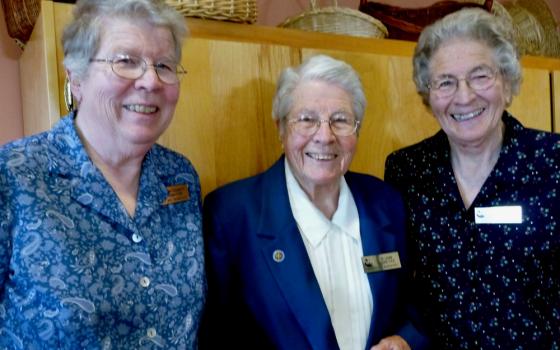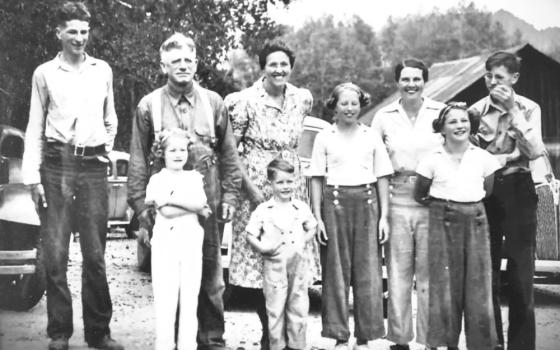When Benedictine Sr. Kathleen Cogan began writing short stories about her family, she just wanted to give herself something to do while she recovered from a 2014 stroke in Colorado Springs, Colorado. She thought her nieces and nephews would enjoy learning about growing up on her family's ranch two hours west of Colorado Springs.
A few years later, those stories were published in what became her first book, Three Nuns From the Ranch, named for Cogan and her two biological sisters, Elizabeth and Leeann, who became Benedictine sisters together. Her sisters contributed a few stories to the 106-page book.
Throughout her recovery from her stroke, Cogan, formerly a teacher and nurse, decided to begin writing, a new hobby that culminated in a time capsule for her family that became a published book at no cost to her.
GSR: I understand that the catalyst for your book was to regain mental acuity after you suffered a stroke. How did the stroke affect your daily life?
Cogan: Right after my stroke, I didn't even know my own two blood sisters that are in the convent here with me. I didn't know anyone calling me on the phone; I didn't know who they were or what they were talking about. It took me a week to recognize my own sisters who visited me every day.
I couldn't walk, couldn't transfer to a chair without help. I'm big — a 6-footer — and it took two or three people to transfer me safely.
I gradually got better. After about a month in rehab and two weeks in the hospital, I came home. Since then, about every three days or week, I got therapy from an outside agency.
But the worst thing was, someone gave me a good book, and I used to love to read. But I'd be on Page 2 and have to look back on Page 1 to see who the characters were, so it was impossible to read. I had always done cross-stitch as entertainment for years. But I couldn't keep my right hand safe enough because the stroke really bothered that hand.
I couldn't remember what happened yesterday, but the one thing I kept remembering was my family. I have 27 first-generation nieces and nephews, and I thought to myself, they'll never know the history or the stories that we know unless somebody writes them. I couldn't write well, but I used two fingers on my computer, so I typed out a bunch of these stories. I thought we were just going to diddle them and send them to my nieces and nephews so that they had the information.
 How did your writing reach people outside your family?
How did your writing reach people outside your family?
One day, a gentleman at Mass said to me, "My wife is at home and she's in bed, and she's so bored. Do you have anything you're reading that could be good?"
And I said, "No, but I have stories about the ranch, would she like those?"
So he came over and got them to his wife. About three weeks later, she came to visit, and she had a lady with her who was an editor. She looked me square in the eye and said she'd edit it for nothing.
About two weeks after that, she called and said the next step would be to get it typed for printing. She knew someone who would do that, and the same person would do a cover for it. [My biological sister and fellow Benedictine] Elizabeth asked how much this would cost, and she said, "That's all taken care of." And all at once, there came a book.
The lady in our gift shop said she would like to try to sell five of them, though she sounded very doubtful. Well, this really exploded; I'm sure we sold more than 250 books. [My biological sisters and I] taught in many states, so we met lots of people, and these people were all interested in seeing three nuns on the cover on a ranch.
What kinds of stories are included in the book?
There's no murder and no sex. We grew up poor on the ranch with seven kids in the family, and the funny thing was we never were alone. My mother's brother died and left two boys, and we had them every summer. And my mother's sister had multiple sclerosis and a daughter that she couldn't take care of, so we took care of her, too. We always had a houseful.
We had a lot of tramps sit out behind our house, and my mother taught us to be good to them like we would be to anybody's daddy, because they're daddies to other kids. So we learned to be nice to people like that. We always took care of elderly people who didn't have enough to eat.
I wrote about my early history on the ranch, and I wrote what I did as a teacher, as a nurse and a chaplain, and Leeann — she was 97 when she died — wrote about all her teaching, being a principal and becoming superintendent. My younger sister Elizabeth taught high school physics and math. She wrote all her stories, too, and she had some wild ones.
Do you attribute writing the book to bouncing back mentally?
I came home in February 2014 and gradually, just with the community around, I started to remember things that happened in community. I think the biggest thing was just trying to do something that I wouldn't waste my life. I wanted to do something, even if it was just to entertain the nieces and nephews. I started in 2014, and it came out in August of this year.
I have a little sister who has a lot of children, and they would visit, so I had a lot of stimulation from the outside. That was key.
How did you choose which memories to include?
They were the ones I remembered the best. There's a lot about traveling. I would ask my sisters if I didn't remember the rest of the story, and they would tell me.
What did your nieces and nephews think?
They love it. They're all getting it for their kids. I was at Mass, and a perfectly strange man came up to me and said, "I want to buy one for my daughter for Christmas."
How did strangers learn about the book?
I had an interview with the person in charge of our local paper here, The Gazette, and she put a whole page in the Sunday edition. That paper is well-read, and since all of us have taught someplace here in Colorado Springs, everyone knew us.
Tell me about the emotional experience in writing this book. Beyond being a mental exercise and a way to relay stories to your family, how did writing this book help you? Was it therapeutic?
It helped me immensely because if I didn't know the end of a story, I had to find it out from my family. I didn't know our grandfather's story very well, and my youngest brother helped me with that, because Dad lived with him a long time after my mother was dead. And Dad was blind and would tell [my brother] Joe everything, so Joe had a good background.
When my grandfather left Ireland, he was going to be hanged the next day. He escaped, left his pregnant wife and four children, and came to the U.S., and his first job was about 3 miles from where our home ranch is. Somebody said he had blown up a bridge and that the British were out to hang him.
Everybody helped me put it together, thinking we're doing it for the family, and then all this happened.
I think the greatest experience is how it got my head back together. I've come a long way: I can read a book now, and I've learned to type with more than two fingers. I'm 88, so it's been quite an experience.
[Soli Salgado is a staff writer for Global Sisters Report. Her email address is ssalgado@ncronline.org. Follow her on Twitter: @soli_salgado.]


